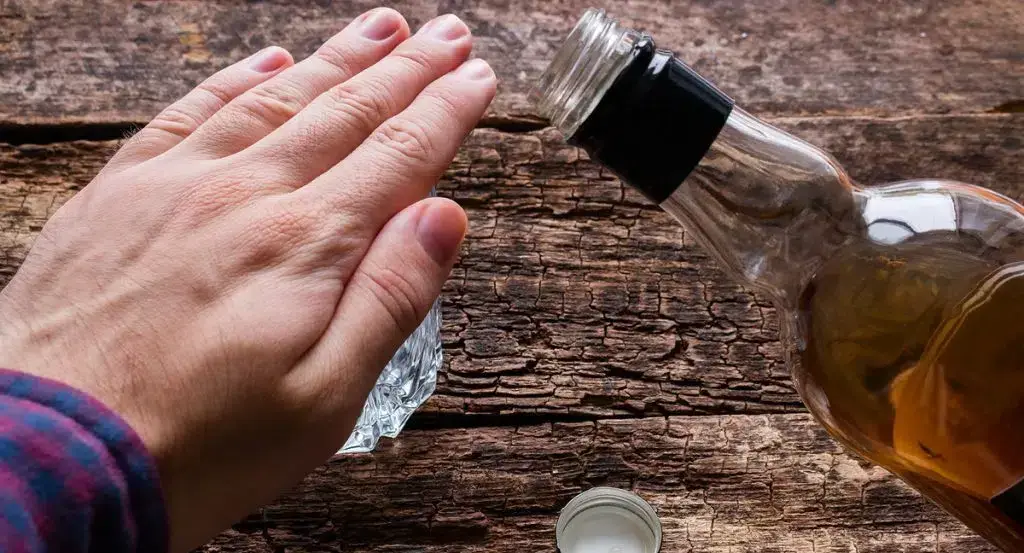
Admitting you have a problem with alcohol and getting sober isn’t easy, but it doesn’t always become easier when you stop drinking. Sooner or later you’re going to face another challenge: telling people that you have a struggle with alcoholism.
Sometimes a period of life lived under the shadow of an addiction to alcohol takes place in private, away from public knowledge; sometimes it takes place out in full view of friends or family. Either way, you’re going to need to let the people close to you understand why you won’t be drinking around them, even if they had no idea you struggled or ever saw you drunk.
For many, a true commitment to sobriety means no drinking, ever. Imagining that you can do it while keeping it a secret only means creating a more awkward situation — for example, right as they bought you a round at the bar or poured you a glass at dinner because they didn’t know you’ve stopped—or worse, invites the temptation to accept the drink, leading to even larger problems.
You Don’t Have To Tell Everybody Right Away
Particularly in the age of reality television and social media, there’s a perception that “big reveals” are part of getting sober. You might picture an intervention with everybody present or a social media post announcing your decision to stop drinking to everyone you know. While this is common, you don’t have to do this. In fact, it may be easiest to start small and private.
This Season, Give Yourself the Gift of a Fresh Start.
Whether you are struggling with addiction, mental health or both, our expert team is here to guide you every step of the way. Don’t wait— reach out today to take the first step toward taking control of your life.
You can begin by telling the people who will most clearly and readily agree with your assessment that you struggle with alcoholism—perhaps somebody close to you who had a front-row seat to the way you harmed yourself with alcohol. If you are sincere and they are supportive, the odds are high that they will be receptive to your news, increasing your confidence in your decision as you decide to tell the next person or people on your list.
Have A Commitment Ready
Someone with an alcohol use disorder will often experience near-misses with quitting and periods of regret and apologizing. It’s also possible to form codependent relationships and go through mood swings before a successful sobriety sticks. This means that people might already have heard you say a few times, “I’m so sorry I drank so much last night” or, “I got out of control, I promise I won’t do that again.” To help them understand why this time is different, make a commitment and be ready to share that with them.
The only commitment necessary, of course, is, “I am sober now and promise to abstain from alcohol,” but it can help to also couple this with a more specific commitment to show you are serious. Your spouse might already have heard, “I swear I will change” before, but what if you said, “I swear I will change, and to show you I mean it, I removed all the alcohol from our house”?
Alternatively, you might show that you are serious by pointing out that your commitment to ending your addiction is strong enough to take precedence over temptation right now. For example, you might say, “I realize now I will be tempted to use drugs if I attend the music festival this weekend, so I decided to sell my tickets.”
A recent study by Harvard Medical School found that concrete commitments to sobriety (such as “I am definitely not going to consume alcohol ever again, beginning today”) resulted in statistically significant greater success at the one-year mark than abstract thoughts in favor of sobriety (“I ought to stop drinking” or “I believe I should stop”). Put these statistics to work in your favor by sharing the firm commitments with people who can watch you follow through with them and support you along the way.
You Don’t Have To Tell Everyone, But You Must Be Ready To Tell Anyone
While you don’t need to tell everybody right away, you will likely be faced with social situations in which people will expect, by default, that you drink. In each scenario, you will either need to inform them that you don’t or have another way to successfully navigate or exit the situation. A coworker might offer you a glass of wine at the company holiday party or your friend who lives abroad may visit home and want to grab a drink. Not everybody will need to (or should) hear your life story, but have something ready to say to put the topic to rest.
In nearly any situation, simply saying “I don’t drink” with no further explanation or qualifiers will suffice. People will occasionally become naturally curious and then inquire why you don’t drink. Some easier statements as a follow-up include, “I avoid alcohol for my health” (technically, very true!) or, “I used to drink, but I don’t anymore” (also true!).
Further elaboration is entirely optional—what you share and with who is entirely up to you and your comfort level. When you say, “I don’t drink,” it is completely okay to be considered the end of the conversation, even if the other party does not acknowledge it as such. If the other party continues to press the issue, simply repeating, “But I don’t drink” in response to every question can help get the message across. You can also politely excuse yourself from the situation and exit. While it can be frustrating, it is unambiguous and leaves no room for misinterpretation.
Coworkers Are Optional
Generally speaking, being open and clear with those around you is best, but you may want to put additional consideration into what you share with your employer and coworkers. In a professional environment, particularly in fields that have a strong “work hard, play hard” culture such as restaurants, tech, construction, law, and finance, an admission of an alcohol problem could be viewed as a liability by your current employer, or a character flaw among peers (despite the National Institute on Drug Abuse defining addiction as a chronic disease). It is entirely acceptable to keep this information from coworkers if it helps protect your livelihood.
Remember that religion and pregnancy are both federally protected statuses and completely legitimate reasons for any person, even one who does not struggle with alcoholism, to go from being a drinker to a teetotaler, so it is never okay for any workplace to incentivize or require drinking at work-related functions.
For more information, the Substance Abuse and Mental Health Services Administration has a legal assistance worksheet on the intersection of alcohol and employment here.
If you are living with an alcohol addiction and seeking support during your journey toward sobriety, The Recovery Village is here to help. We have locations around the country, and we provide residential treatment, as well as partial hospitalization and intensive outpatient programs. Contact us today to discuss how our services can benefit you.









